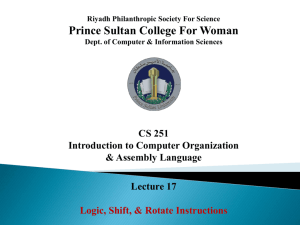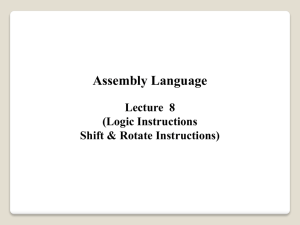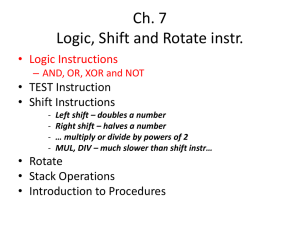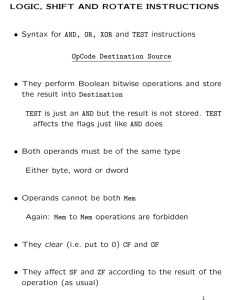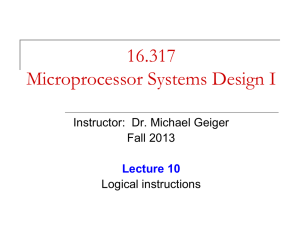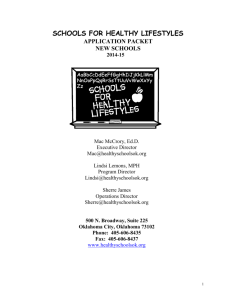File - onlyprogrammerz
advertisement
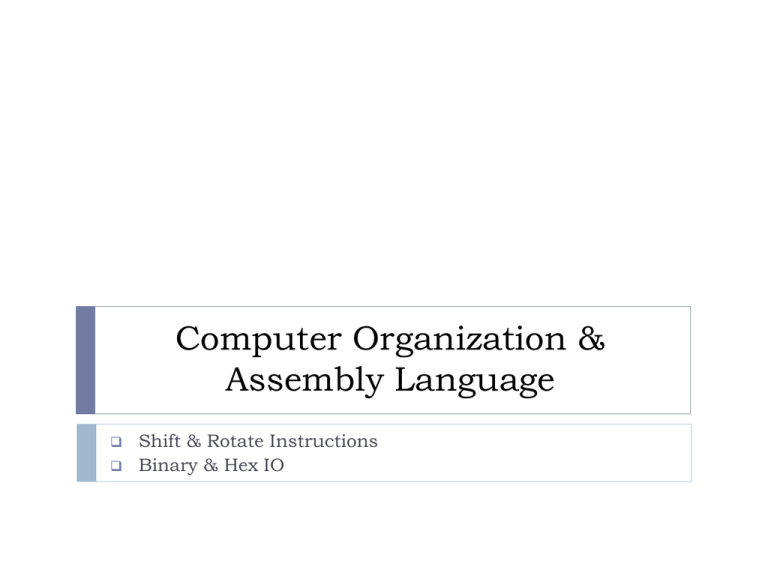
Computer Organization & Assembly Language Shift & Rotate Instructions Binary & Hex IO Shift/Rotate Instructions Shift the bits in destination operand by one or more positions either to the left or right. Shift: Bit shifted out is lost Rotate: Bit shifted out from one end of the destination operand is put back on the other end. Syntax: OPCODE destination, 1 ;single shift/rotate OPCODE destination, CL ;for N positions shift/rotate Where: destination can be 8-bit or 16-bit registers or memory variable 2 Shift Instructions SHL Instruction (Left Shift) SAL (Shift Arithmetic Left) SHR (Right Shift) SAR (Shift Arithmetic Right) 3 The SHL Instruction Shifts the bit in destination to the left Effects on flags: SF, PF, ZF reflects the result AF is undefined CF = last bit shifted out OF = 1 if result changes sign on last shift Example: DH = 8Ah CL = 3 Value of DH and CF after executing instruction: SHL DH, CL Solution: DH = 50h, CF = 0 4 Contd.. Multiplication by left shift 5 Consider digit 235, if each digit is shifted left one position and a 0 is attached at right end, the value will be 2350 Same as Multiplying 235 by 10 Left shift on a binary number means multiplying the number by 2 Example: If AL = 5d, after left shift AL = 10d, after another left shift AL = 20d The SAL Instruction Used when numeric multiplication is intended Both SHL and SAL instructions generates same machine code. Example: Multiply AX by 8 MOV CL, 3 SAL AX, CL 6 The SHR Instruction Performs right shift on destination operand. A 0 is shifted into MSB and rightmost bit is shifted to CF. The effect on flag is same as SHL. Example: DH = 8Ah CL = 2 After executing instruction: SHR DH, CL: CF = 1 and DH = 22h Erase rightmost two bits and add two 0 bits to the left end If an unsigned interpretation is being given, use SHR. 7 The SAR Instruction Operates like SHR, with one difference: the MSB retains its original value. If number is even, one right shift is same as divide the number by 2. If number is odd, one right shift halves it and rounds down to nearest integer. Example: BL = 0000 0101b = 5d After one right shift: BL = 0000 0010b = 2d If an signed interpretation is being given, use SAR. (preserves the MSB) 8 Examples Use right shift to divide unsigned number 65143 by 4. Put quotient in AX. Solution: MOV AX, 65143 MOV CL, 2 SHR AX, CL If AL contains -15, give the decimal value of AL after SAR AL, 1 is performed. Solution: The instruction will divide –15 by 2 and round it down to –8 AL = 1111 0001b AL = 1111 0000b = – 8 9 Rotate Instructions ROL (Rotate Left) MSB is shifted into the rightmost bit CF also gets the bit shifted out of the MSB Syntax: ROL destination, 1 ROL destination, CL ROR (Rotate Right) The rightmost bit is shifted into MSB and also into CF. Syntax: ROR destination, 1 ROR destination, CL 10 Contd.. RCL (Rotate Carry Left) Shifts the bit of destination to the left The MSB is shifted into CF and the previous value of CF is shifted into the rightmost bit. Syntax: RCL destination, 1 RCL destination, CL RCR (Rotate Carry Right) Works just like RCL except that the bits are rotated to the right. Syntax: RCR destination, 1 RCR destination, CL 11 Effects of Rotate Instruction on Flags SF, PF, ZF reflects the result AF is undefined CF = last bit shifted out OF = 1 if result changes sign on the last rotation 12 Example Use ROL to count the number of 1 bits in BX, without changing BX. Put answer in AX Solution: XOR AX,AX MOV CX, 16 TOP: ROL BX, 1 JNC NEXT INC AX NEXT: LOOP TOP 13 Example Suppose DH contains 8Ah, CF = 1, and CL contains 3. What are the values of DH and CF after the instruction RCR DH, CL is executed? Solution: CF DH Initial value 1 1000 1010 After 1 right rotation 0 1100 0101 After 2 right rotations 1 0110 0010 After 3 right rotations 0 1011 0001 = B1h 14 An application of reversing bit pattern AL = 1101 1100, Required = 0011 1011 MOV CX, 8 REVERSE: SHL AL, 1 RCR BL, 1 LOOP REVERSE MOV AL, BL 15 Binary Input Algorithm to read a binary number from keyboard and stored it in BX Clear BX Input a character While character <> CR Do Convert character to binary value Left shift BX Insert value into LSB of BX Input a character End_While 16 Contd.. Assembly Language Code for Binary Input: XOR BX, BX MOV AH, 1 INT 21h WHILE_: CMP AL, 0Dh JE END_WHILE AND AL, 0Fh ;convert to binary value SHL BX, 1 OR BL,AL INT 21h JMP WHILE_ END_WHILE: 17 Binary Output Algorithm: FOR 16 TIMES DO ROTATE LEFT BX IF CF = 1 THEN OUTPUT ‘1’ ELSE OUTPUT ‘0’ END_IF END_FOR 18 Hex Input Assumptions: Only uppercase letters Maximum four hex characters Algorithm for Hex Input: CLEAR BX Input Hex Character WHILE Character <> CR DO Convert Character To Binary Value Left Shift BX Four Times Insert Value Into Lower 4 Bits Of BX Input A Character END_WHILE 19 Hex Output Algorithm: For 4 Times Do Move BH to DL Shift DL 4 times to the right IF DL < 10 THEN Convert to character in ‘0’….’9’ ELSE Convert to character in ‘A’….’F’ END_IF Output Character Rotate BX left 4 times END_FOR 20

